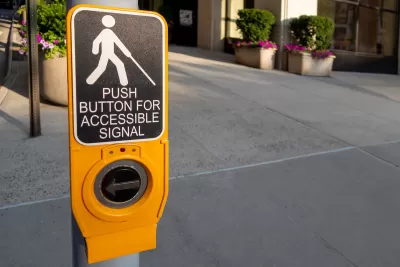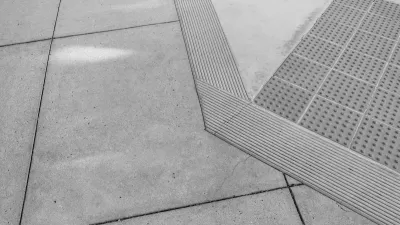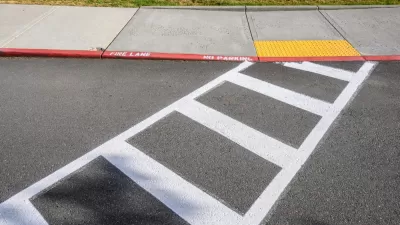The new rules could help bridge the gaps in accessibility infrastructure and ADA compliance, making roads and sidewalks safer for everyone.

Writing in Strong Towns, Ben Abramson asserts that newly approved Americans with Disabilities Act (ADA) and Architectural Barriers Act (ABA) Public Right-of-Way Accessibility Guidelines (PROWAG) “promise to make American towns and cities safer and more predictable for users of all abilities.”
The new guidelines “address access to sidewalks and streets, crosswalks, curb ramps, pedestrian signals, on-street parking, and other components of public rights-of-way,” Abramson adds.
The new PROWAG adds accessibility requirements to pedestrian access routes such as slope, calls for alternate access routes in construction areas, and mandates curb cuts and detectable warning surfaces at crosswalks. It also requires accessible pedestrian signals, “which have audible and vibrotactile features indicating the walk interval so that a pedestrian who is blind or has low vision will know when to cross the street.”
The guidelines also address accessibility at transit stops and accessible parking spaces in neighborhoods with street parking.
For Strong Towns director of community action Edward Erfurt, “the level of detail in the new guidelines is a game changer” that will bring new best practices to cities that have lagged behind in implementing accessibility improvements. “This specificity, and the legal requirement that planners and engineers adhere to the guidelines, promises to bring improvements that will make everyone in American cities safer.”
FULL STORY: New PROWAG Guidelines a Major Advance for ADA (and All Pedestrians)

Planetizen Federal Action Tracker
A weekly monitor of how Trump’s orders and actions are impacting planners and planning in America.

Map: Where Senate Republicans Want to Sell Your Public Lands
For public land advocates, the Senate Republicans’ proposal to sell millions of acres of public land in the West is “the biggest fight of their careers.”

Restaurant Patios Were a Pandemic Win — Why Were They so Hard to Keep?
Social distancing requirements and changes in travel patterns prompted cities to pilot new uses for street and sidewalk space. Then it got complicated.

Maui's Vacation Rental Debate Turns Ugly
Verbal attacks, misinformation campaigns and fistfights plague a high-stakes debate to convert thousands of vacation rentals into long-term housing.

San Francisco Suspends Traffic Calming Amidst Record Deaths
Citing “a challenging fiscal landscape,” the city will cease the program on the heels of 42 traffic deaths, including 24 pedestrians.

California Homeless Arrests, Citations Spike After Ruling
An investigation reveals that anti-homeless actions increased up to 500% after Grants Pass v. Johnson — even in cities claiming no policy change.
Urban Design for Planners 1: Software Tools
This six-course series explores essential urban design concepts using open source software and equips planners with the tools they need to participate fully in the urban design process.
Planning for Universal Design
Learn the tools for implementing Universal Design in planning regulations.
Heyer Gruel & Associates PA
JM Goldson LLC
Custer County Colorado
City of Camden Redevelopment Agency
City of Astoria
Transportation Research & Education Center (TREC) at Portland State University
Camden Redevelopment Agency
City of Claremont
Municipality of Princeton (NJ)





























